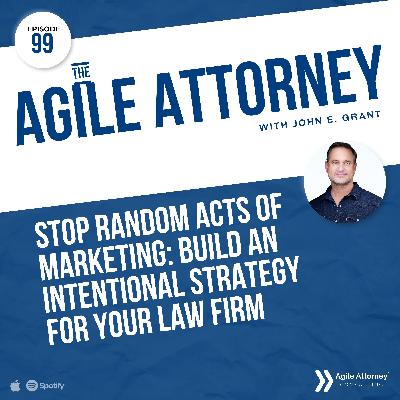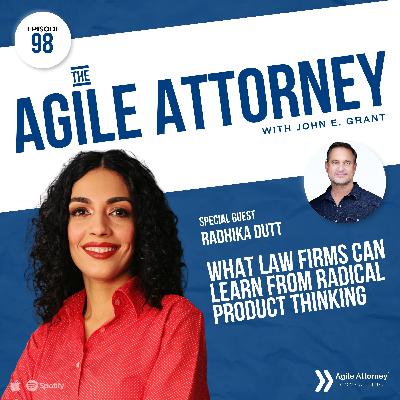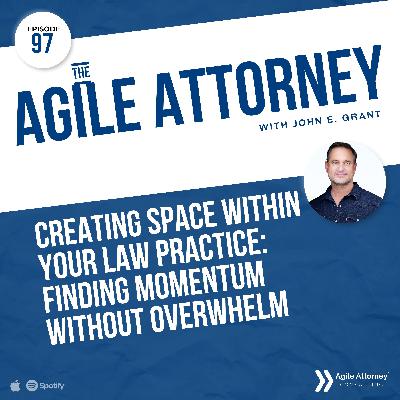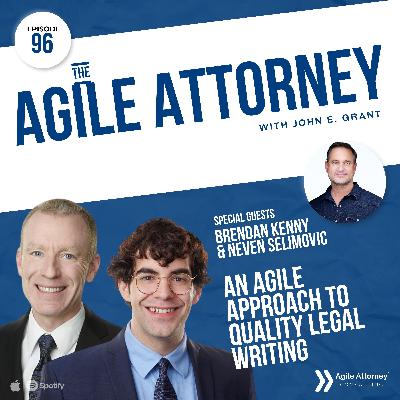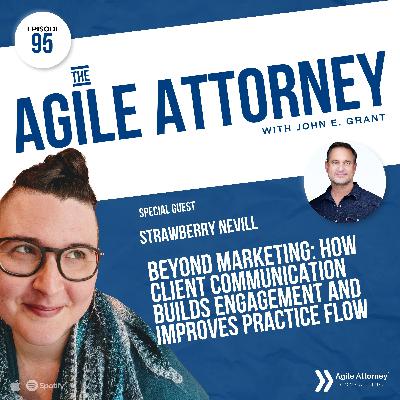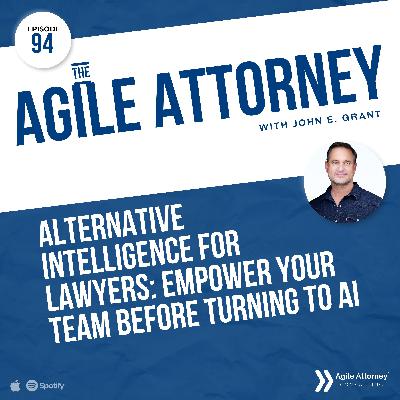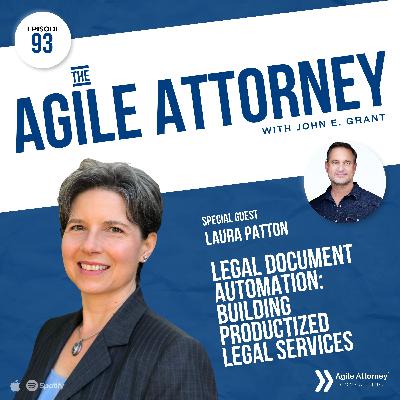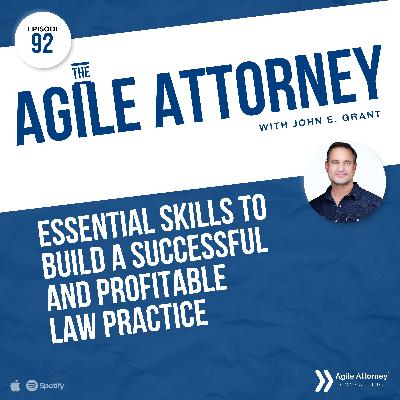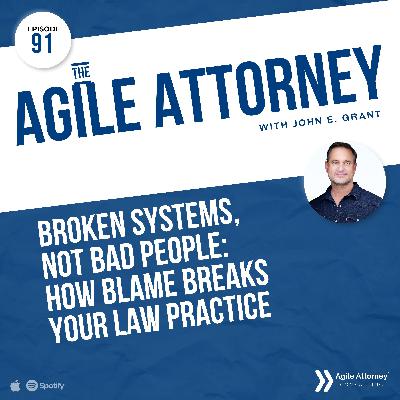Discover The Agile Attorney Podcast
The Agile Attorney Podcast

The Agile Attorney Podcast
Author: John E. Grant
Subscribed: 8Played: 190Subscribe
Share
© 2020-26 Agile Professionals, LLC
Description
The Agile Attorney podcast teaches legal professionals how to streamline their legal workflows using the principles, practices, and tools of the Kanban Method.
Join Accredited Kanban Trainer and award-winning legal operations professional John E. Grant as he shares the keys to implementing effective strategies, practices, and technologies to drive true efficiency in your legal processes.
For more information on how John can help you develop an agile mindset and bust through your legal delivery bottlenecks, visit https://agileattorney.com.
This is the show for you if you find yourself asking questions like:
-How can I make my law practice more efficient?
-What is the best way to implement legal project management in my legal workflow?
-How can I best leverage technology to improve my legal workflows?
-What is the best way to transition my practice to flat fees or other alternative billing structures?
-How can I get my legal team to perform better?
-How can I better build productized legal services?
-What is the best way to increase law firm revenue without adding headcount?
Join Accredited Kanban Trainer and award-winning legal operations professional John E. Grant as he shares the keys to implementing effective strategies, practices, and technologies to drive true efficiency in your legal processes.
For more information on how John can help you develop an agile mindset and bust through your legal delivery bottlenecks, visit https://agileattorney.com.
This is the show for you if you find yourself asking questions like:
-How can I make my law practice more efficient?
-What is the best way to implement legal project management in my legal workflow?
-How can I best leverage technology to improve my legal workflows?
-What is the best way to transition my practice to flat fees or other alternative billing structures?
-How can I get my legal team to perform better?
-How can I better build productized legal services?
-What is the best way to increase law firm revenue without adding headcount?
113 Episodes
Reverse
Most law firms improve internal workflows without ever defining the full client experience. That blind spot creates unnecessary friction for both clients and teams. In this episode, I explain why building a client journey map is a powerful strategic move for law firm owners who want stronger client engagement and more cohesive operations. When you can see the journey clearly, everything else starts to align. Get full show notes, transcript, and more information here: agileattorney.com/108Take your law practice from overwhelmed to optimized with GreenLine LegalFollow along on LinkedIn: linkedin.com/in/johnegrant
Imagine getting into your car and realizing the only gauge on the dashboard shows how hard the engine is working. No speedometer, no fuel gauge, just RPMs. That is how most law firms operate.In this episode, I introduce a better dashboard built around six practical law firm metrics that help you manage the work, not the worker. These metrics are not about squeezing more hours out of your team. They are about creating clarity, balance, and predictable delivery.Get full show notes, transcript, and more information here: agileattorney.com/107Take your law practice from overwhelmed to optimized with GreenLine LegalFollow along on LinkedIn: linkedin.com/in/johnegrant
Does your law firm feel like it’s constantly reacting instead of progressing? In this episode, I break down how urgency becomes the default operating system in many practices and how to replace it with a calmer, more predictable way of working. You’ll hear how capacity limits, first-in-first-out prioritization, and simple cadence meetings can shift your firm away from fire-fighting and toward consistent delivery, without relying on willpower or heroics. Get full show notes, transcript, and more information here: agileattorney.com/106Take your law practice from overwhelmed to optimized with GreenLine LegalFollow along on LinkedIn: linkedin.com/in/johnegrant
Getting more work done often starts with doing less, even though that idea can feel uncomfortable for lawyers. When everything feels urgent, it’s tempting to push harder, take on more, and hope it all evens out.In this episode, I explain why the most reliable way to increase throughput in a law practice isn’t effort or efficiency, but smarter constraints. You’ll hear how counterintuitive Agile principles help firms reduce overload, protect capacity, and deliver more consistently without burning out the people doing the work.Get full show notes, transcript, and more information here: agileattorney.com/105 Take your law practice from overwhelmed to optimized with GreenLine LegalFollow along on LinkedIn: linkedin.com/in/johnegrant
For many legal professionals, one of the most persistent sources of stress isn't the complexity of the law itself but the uncertainty that permeates daily work. Not knowing who's doing what, when something is actually done, or whether it's been done correctly.In this episode, I'm tackling this uncertainty head-on by showing you how to create explicit quality standards that serve as a stabilizing force for your practice with simple, easy-to-implement tools. You'll learn how to create fit-for-purpose quality standards, why explicit policies reduce rework, and practical guidance on developing these standards in the context of your current work without trying to boil the ocean.Get full show notes, transcript, and more information here: agileattorney.com/104Take your law practice from overwhelmed to optimized with GreenLine LegalFollow along on LinkedIn: linkedin.com/in/johnegrant
Once you make your work visible, you can finally see how much of your work is just stuck. And while a common reaction is to think that you are the bottleneck, that thinking is actually preventing you from understanding something much more useful and ultimately less personal about bottlenecks in law firms and how work is actually flowing through your legal delivery systems.In this episode, I’m building on last week's discussion of making work visible. The focus now shifts from seeing where work is to getting work to flow. You'll learn how to find the most important place where work is getting stuck, the best way to improve flow, and why treating process improvement as a team sport and approaching it with curiosity rather than judgment will yield far better outcomes than trying to fix everything yourself.Get full show notes, transcript, and more information here: agileattorney.com/103Take your law practice from overwhelmed to optimized with GreenLine LegalFollow along on LinkedIn: linkedin.com/in/johnegrant
What happens when good intentions collide with finite capacity? In many law practices, it shows up as overload, missed deadlines, and promises that quietly slip through the cracks.In this episode, I’m introducing the idea of a promise-keeping machine and explaining why making work visible is the first and most important step toward building one. You’ll learn how simple visual systems like Kanban help lawyers see their true commitments, protect capacity, and make more credible promises to clients, colleagues, and themselves.Get full show notes, transcript, and more information here: agileattorney.com/102Take your law practice from overwhelmed to optimized with GreenLine LegalFollow along on LinkedIn: linkedin.com/in/johnegrant
A new year and a new number on the podcast episodes feels like the perfect time to slow down for a moment and get back to some foundational questions. In this episode, I’m kicking off a reboot of The Agile Attorney Podcast with a return to first principles.You'll discover why so many legal professionals feel pressure to do more and more work, why that so often leads to overwhelm and burnout, and how you can start to prevent that overwhelm by focusing on what it really means to be agile in a world that keeps demanding more.Get full show notes, transcript, and more information here: agileattorney.com/101Take your law practice from overwhelmed to optimized with GreenLine LegalFollow along on LinkedIn: linkedin.com/in/johnegrant
When massive technology projects spiral out of control, teams often feel like they're trapped in an endless cycle of changing requirements, missed deadlines, and mounting frustration.In this episode, I sit down with my GreenLine co-founder, Dimitri Ponomareff, to explore how he discovered a different way forward during one of those classic "death march" projects early in his career. You'll discover the Agile lessons he carried forward from his early Agile experiments, and how they translate directly into the way modern law firms can operate with more calm, more confidence, and far more control.Get full show notes, transcript, and more information here: agileattorney.com/bonus2Take your law practice from overwhelmed to optimized with GreenLine LegalFollow along on LinkedIn: linkedin.com/in/johnegrantFollow Dimitri on LinkedIn: linkedin.com/in/dimka5
When lawyers tell me their practice is too unique for standardized processes, I hear the same concern echoed across every type of legal work. We believe our complexity makes us special, that our clients' needs are too varied to systematize. But in this episode, I'm joined by process expert Joe Bockerstette, who brings a perspective forged across manufacturing floors, angel investment firms, and county public defender offices that challenges this fundamental assumption. Through our conversation, you’ll discover the universal fundamentals of how work gets done so you can create the clarity and consistency that transform how your team operates. Get full show notes, transcript, and more information here: agileattorney.com/bonus1 Take your law practice from overwhelmed to optimized with GreenLine LegalFollow along on LinkedIn: linkedin.com/in/johnegrantFollow Joe on LinkedIn: linkedin.com/in/joe-bockerstette-86875a17
In this special episode, I explore the three drivers that have sustained this podcast: perspiration, inspiration, and determination. I share personal stories that shaped my mission and the lessons learned. After 100 episodes of sharing tactics and advice, this is my chance to pull back the curtain on the bigger picture of building practices that are profitable, sustainable, and scalable. Get full show notes, transcript, and more information here: agileattorney.com/100 Take your law practice from overwhelmed to optimized with GreenLine Legal Follow along on LinkedIn: linkedin.com/in/johnegrant
When leads slow down, most firms respond with a burst of random marketing activity, but that reactive approach rarely works. In this episode, I’m explaining why marketing must be a coherent system, not a scramble, and share practical steps for creating an intentional strategy rooted in ideal client profiles, referral partner relationships, and alignment with your firm’s actual capacity. Get full show notes, transcript, and more information here: agileattorney.com/99 Take your law practice from overwhelmed to optimized with GreenLine Legal Follow along on LinkedIn: linkedin.com/in/johnegrant
Most lawyers don’t think of their work as a product, but according to Radhika Dutt, author of Radical Product Thinking, that mindset is exactly what keeps firms stuck in reactive mode. In this episode, Radhika and I explore how product thinking applies directly to legal services and why defining the change you want to create for clients is the foundation for a sustainable, client-centered practice. Whether you manage a team or operate solo, this episode will help you rethink how your firm creates value and give you a more structured way to build services that scale without losing the human impact at the center of legal work. Get full show notes, transcript, and more information here: agileattorney.com/98 Take your law practice from overwhelmed to optimized with GreenLine LegalFollow along on LinkedIn: linkedin.com/in/johnegrantFollow Radhika on LinkedIn: linkedin.com/in/radhika-dutt
Creating space in your law practice begins with understanding your true capacity and the demands already filling it. In this episode, I share practical ways to assess what your system can actually handle, close out the work that’s weighing you down, and set clearer boundaries for new commitments using core Kanban principles. You’ll learn simple techniques for regaining breathing room so you can end the year with more intention and start the next one with a workflow that’s sustainable for you and your team. Get full show notes, transcript, and more information here: agileattorney.com/97 Take your law practice from overwhelmed to optimized with GreenLine Legal Follow along on LinkedIn: linkedin.com/in/johnegrant
When high-stakes motions are due, most firms face bottlenecks, inconsistent quality, and last-minute chaos. In this episode, Hellmuth & Johnson attorneys Brendan Kenny and Neven Selimovic share how they've rebuilt their legal writing process using Kanban visibility, Agile principles, and smart AI support to deliver consistent, high-quality work. Their internal system worked so well that they now offer it as a legal writing subscription, helping other firms adopt a more predictable, scalable approach. Get full show notes, transcript, and more information here: agileattorney.com/96 Take your law practice from overwhelmed to optimized with Greenline LegalFollow along on LinkedIn: linkedin.com/in/johnegrantFollow Brendan on LinkedIn: linkedin.com/in/brendanmkennyFollow Neven on LinkedIn: linkedin.com/in/neven-selimović-b53717b4
Legal professionals often think of communication strategy as part of their marketing toolkit - a way to attract and convert clients to their law practice. But quality communication strategy extends far beyond getting clients to sign your engagement letter. It becomes a tool for continuously re-recruiting the client to their own cause and ensuring true alignment around solving their legal issue. I’m joined this week by legal communication strategist Strawberry Nevill, where we explore how ethical communication can drive and shape demand for your services. We discuss practical ways to use marketing principles not just to attract the right clients, but to create more peaceful, productive relationships throughout their entire matter. Plus, you'll discover how thoughtful communication reduces those Friday afternoon fire drills and creates the kind of client engagement that makes your practice more sustainable. Get full show notes, transcript, and more information here: agileattorney.com/95 Take your law practice from overwhelmed to optimized with Greenline LegalFollow along on LinkedIn: linkedin.com/in/johnegrantFollow Strawberry on LinkedIn: linkedin.com/in/strawberry-nevill
Everyone’s talking about artificial intelligence, but before you invest in new tools and software, it’s worth looking at the alternative intelligence already inside your firm. Drawing on insights from W. Edwards Deming, this episode looks at why empowering your team’s creativity and problem-solving ability often drives greater improvement than AI ever could. You’ll learn how to make work visible, build psychological safety, and turn everyday team members into continuous-improvement partners, so your law practice runs better, not just faster. Get full show notes, transcript, and more information here: agileattorney.com/94Take your law practice from overwhelmed to optimized with Greenline LegalFollow along on LinkedIn: linkedin.com/in/johnegrant
Life can change in an instant. For attorney Laura Patton, that moment came when her college-age son landed in the emergency room, and she discovered that without proper legal documents, she couldn't even speak to his doctor about his condition. By combining her decades of estate planning experience with open-source document automation tools, Laura created a scalable, affordable solution that protects families while preserving the personal connection at the heart of her practice. In this episode, Laura shares how thoughtful use of document automation can expand access to justice, improve efficiency, and strengthen client relationships. You'll learn how lawyers can identify opportunities to systematize repetitive work, build productized legal services, and design innovative, human-centered solutions for modern legal practice. Get full show notes, transcript, and more information here: agileattorney.com/93Take your law practice from overwhelmed to optimized with Greenline LegalFollow along on LinkedIn: linkedin.com/in/johnegrant
Building a new law practice requires confronting the reality of what actually works, not just what should work in theory. The natural tendency for lawyers starting something new is to perfect every system and procedure before launching, but this perfectionist approach often becomes the very thing that prevents real progress. This week, I'm breaking down why the essential skill for new legal business owners isn't doing the legal work, it's getting the work. Drawing from a recent consultation with an attorney who wanted to dial in all their systems before ramping up their practice, I explain why this cart-before-the-horse approach misses what really matters. Get full show notes, transcript, and more information here: agileattorney.com/92Take your law practice from overwhelmed to optimized with Greenline LegalFollow along on LinkedIn: linkedin.com/in/johnegrant
When someone on your team drops the ball or a client misses a deadline, it's tempting to write them off as disorganized or unmotivated. This snap judgment feels natural - after all, if they cared enough, they'd follow through, right? In today's episode, I'm unpacking the fundamental attribution error - a cognitive bias that makes us blame people's character instead of examining the broken systems they're working within. I'll show you how well-designed workflows can transform your team's performance and why investing in better systems beats endless hiring cycles every time. Get full show notes, transcript, and more information here: agileattorney.com/91Take your law practice from overwhelmed to optimized with Greenline LegalFollow along on LinkedIn: linkedin.com/in/johnegrant


![108. The Client Journey Map: A Systems Tool for Better Client Experience and Law Firm Flow [Agile Lawyering Part 8] 108. The Client Journey Map: A Systems Tool for Better Client Experience and Law Firm Flow [Agile Lawyering Part 8]](https://s3.castbox.fm/b9/c9/56/6b035a5b668089325e453292e57fa150c8_scaled_v1_400.jpg)
![107. Beyond Tracking Hours: The Law Firm Metrics That Improve Flow [Agile Lawyering Part 7] 107. Beyond Tracking Hours: The Law Firm Metrics That Improve Flow [Agile Lawyering Part 7]](https://s3.castbox.fm/41/8d/48/5d1ee7a86d114659e34c2a940d5611cb72_scaled_v1_400.jpg)
![106. Breaking the Cycle of Urgency in Law Firms [Agile Lawyering Part 6] 106. Breaking the Cycle of Urgency in Law Firms [Agile Lawyering Part 6]](https://s3.castbox.fm/19/3a/d2/c09ecd738bbd942a7456de6c769bb37380_scaled_v1_400.jpg)
![105. The Counterintuitive Solution to Getting More Work Done [Agile Lawyering Part 5] 105. The Counterintuitive Solution to Getting More Work Done [Agile Lawyering Part 5]](https://s3.castbox.fm/dd/36/09/ed7e0929e4bf5f25573eb20f0fe05bb21d_scaled_v1_400.jpg)
![104. Quality Standards for Law Firms: How to Make Expectations Explicit and Work Predictable [Agile Lawyering Part 4] 104. Quality Standards for Law Firms: How to Make Expectations Explicit and Work Predictable [Agile Lawyering Part 4]](https://s3.castbox.fm/5b/0e/7b/a1573327d9783de69627fa56b270783a99_scaled_v1_400.jpg)
![103. Bottlenecks in Law Firms: Fixing Flow Without Heroics [Agile Lawyering Part 3] 103. Bottlenecks in Law Firms: Fixing Flow Without Heroics [Agile Lawyering Part 3]](https://s3.castbox.fm/ab/47/6c/0542ea19d14b9c13b6b1cbaaeae0b33e82_scaled_v1_400.jpg)
![102. Build a Promise-Keeping Machine for Your Law Practice [Agile Lawyering Part 2] 102. Build a Promise-Keeping Machine for Your Law Practice [Agile Lawyering Part 2]](https://s3.castbox.fm/f9/82/c4/2ea56038ceb6766832546b1935eb161b76_scaled_v1_400.jpg)

![Managing Capacity by Making Work Visible: Agile Lessons for Law Firms with Dimitri Ponomareff [Bonus] Managing Capacity by Making Work Visible: Agile Lessons for Law Firms with Dimitri Ponomareff [Bonus]](https://s3.castbox.fm/1c/fc/71/0b612a68973823d659c6be6392d59672b7_scaled_v1_400.jpg)
![The Fundamentals of Process Improvement with Joe Bockerstette [Bonus] The Fundamentals of Process Improvement with Joe Bockerstette [Bonus]](https://s3.castbox.fm/48/25/3a/ea55f2d435aa70c7130cb2d707adfa859e_scaled_v1_400.jpg)

